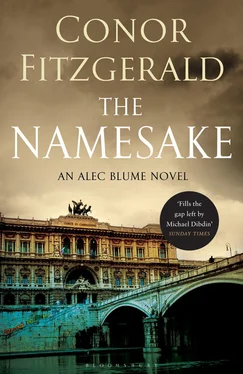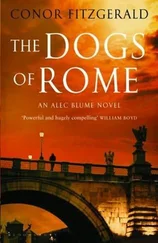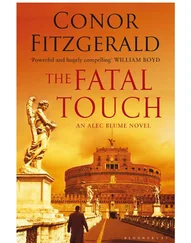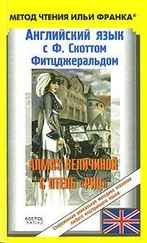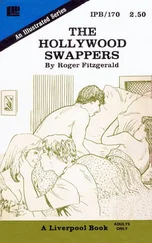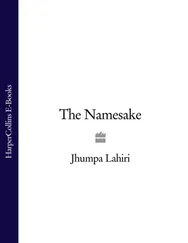Conor Fitzgerald - The Namesake
Здесь есть возможность читать онлайн «Conor Fitzgerald - The Namesake» весь текст электронной книги совершенно бесплатно (целиком полную версию без сокращений). В некоторых случаях можно слушать аудио, скачать через торрент в формате fb2 и присутствует краткое содержание. Жанр: Полицейский детектив, на английском языке. Описание произведения, (предисловие) а так же отзывы посетителей доступны на портале библиотеки ЛибКат.
- Название:The Namesake
- Автор:
- Жанр:
- Год:неизвестен
- ISBN:нет данных
- Рейтинг книги:3 / 5. Голосов: 1
-
Избранное:Добавить в избранное
- Отзывы:
-
Ваша оценка:
- 60
- 1
- 2
- 3
- 4
- 5
The Namesake: краткое содержание, описание и аннотация
Предлагаем к чтению аннотацию, описание, краткое содержание или предисловие (зависит от того, что написал сам автор книги «The Namesake»). Если вы не нашли необходимую информацию о книге — напишите в комментариях, мы постараемся отыскать её.
The Namesake — читать онлайн бесплатно полную книгу (весь текст) целиком
Ниже представлен текст книги, разбитый по страницам. Система сохранения места последней прочитанной страницы, позволяет с удобством читать онлайн бесплатно книгу «The Namesake», без необходимости каждый раз заново искать на чём Вы остановились. Поставьте закладку, и сможете в любой момент перейти на страницу, на которой закончили чтение.
Интервал:
Закладка:
‘Now I’m on your side in this, Commissioner, be assured of that, but can’t you see a slight similarity between your approach and Curmaci’s carelessness about killing an innocent man just because his name happened to match the magistrate’s?’
‘No, I see no similarity at all,’ said Blume. ‘But I did notice you attributed the killing to Curmaci.’
‘Suppose the murder was not even related to the Ndrangheta?’
‘It is,’ said Blume. ‘It’s too symbolic. It fits with how Curmaci operates. Killing a namesake, putting the body next to Via Falcone e Borsellino in remembrance of martyred magistrates, the torn page.’
‘What torn page?’
Blume hesitated, then told Massimiliani about Caterina’s discovery.
‘You think that was some sort of calling card left by Curmaci?’
‘I looked up the name Curmaci a while ago. It means “tree trunk”, so the symbolic gesture fits. Then there were the victim’s dirty stained fingers.’
‘What does that signify?’
‘I haven’t the slightest idea,’ said Blume. ‘But it’s bound to have some sort of symbolic meaning.’
‘Maybe you’re right. But it is not nearly enough for an international arrest warrant.’
‘Nothing ever is,’ said Blume. ‘Which is why forcing him down to Calabria gives us a chance to pick him up.’
‘Us?’
‘You. Someone.’
‘Curmaci would be worth getting. The Ndrangheta reproduces like a cell. First, they make a copy of the rules for building another cell; then, they send someone like Curmaci with the rules abroad. Once the rules are laid down, other members of the original cell start moving abroad, too. You could compare Curmaci to a string of DNA.’
‘A string of RNA would make a more accurate metaphor,’ said Blume. ‘And Arconti compared him to a Catholic missionary. Anyhow, priest or protein, it still seems to me getting rid of him would be a good thing. When I say get rid of…’
‘No need to reassure me, Commissioner. I know you’re not in favour of assassinations, even of the worst. That emerges from your files. But wouldn’t you say Curmaci is too important to be carrying out assassinations in person?’
‘Like I said, do we care if it was him? He killed in the past, at least that’s what Arconti told me.’
‘Oh, he did that,’ said Massimiliani. ‘Definitely. He was an executioner for Old Megale in the 1990s. Then he stopped. It would be unusual for him to start again now.’
Blume shrugged. ‘So he ordered it.’
‘Possibly. Every Ndranghetista who goes abroad, Curmaci included, has to leave family members at home. That way they can operate more freely in the new territory. Their family members gain respect and wealth, but basically, they are hostages. The local Calabrian Ndrangheta can get to them at any time.’
‘That sounds like a weakness waiting to be exploited,’ said Blume.
‘Which is what you are trying to do with your forged confession.’ Massimiliani walked over and tapped Blume lightly on the shoulder. ‘I like that attitude, too. You have convinced me we can work together, now can I convince you?’
‘That depends. What would I be doing?’
‘I can’t say yet.’ Massimiliani pointed at the portfolio he had tossed on the table. ‘Read what’s in there. It will take you about an hour to read, two hours to learn.’
‘What is it?’
‘An old DIA report on the Camorra in Naples and environs. It gives descriptions of their activities, the names of the main families. It’s pretty basic stuff. Actually, I pulled most of it off the internet.’
‘I thought we were talking about the Ndrangheta. What’s the Neapolitan Camorra got to do with anything?’
‘Ah, what indeed? If only we knew.’
‘I’m sure you do know.’
‘As a matter of fact, I don’t. I am not going to talk about it until I know you’re on board. The situation is still developing. I can arrange for the Questore to give you time off, or, if we go down the official route, I can get the Prosecutor General to sign off on your temporary transfer of jurisdiction. If I were you, I’d take the time off. You get paid, and that can be topped up with some travel expenses.’
‘Where would I be travelling to, Naples, Calabria?’
‘I can’t say until we’re agreed. I can say, however, this could open a whole new career for you.’ Massimiliani strode over to the door and looked again at the suitcase. ‘Looks to me like you are already packed and ready to go.’
Massimiliani opened the door. ‘Monday morning, nine o’clock, Polo Tuscolano Operations Centre. Go in the north gate. Use my name. If you’re there at seven, you’re there. If not, no problem. You decide.’
13
Saturday, 29 August
Milan
It was after watching the girl waiting for the number 45 bus climb into the car for the fiftieth time that Magistrate Francesco Fossati suddenly realized why he had been doing this. With a knot in his stomach in case he was too late, he called up the police at the Monforte-Vittoria station immediately and ordered them to sequester all the video recordings from the office building for the previous weeks, only to be told, with a certain tone of disdain, that this had already been done. An hour later, he and an inspector were sitting in his office watching grainy images of the girl as she left the sports centre every other weekday at the same time.
Teresa Resca had been going to the swimming baths on Via Piranesi on Mondays, Wednesdays, and Fridays ever since she finished school in June. She took the 45 bus from her house in San Donato at around two and took it back again at around four. It was almost a door-to-door service, but, to be safe, her father sometimes liked to meet her as she got off and walked back to the house through a narrow, isolated orchard path leading to the apartment block. She always phoned as the bus was drawing close to home. If he could not make it, then she took the long way round, increasing her walk by five minutes. When she failed to call or show up, they called the police immediately.
The father said he knew who it was, what they were doing, why they had done it, and as the investigation moved forwards, it looked like he was right. Giovanni Resca published essays, wrote a blog, gave talks and even put on earnest theatre performances, all for the sake of alerting the Milanese to the fact that the Ndrangheta was very much among them. He had received so many threats from the very start that over a period of five years of campaigning journalism, he had made the fatal mistake of becoming almost blase. He thought they might kill him, because this is what they had threatened, but they had never threatened his wife or their one child. Then the threats stopped, along with Giovanni Resca’s embryonic career in journalism. Branded an agitator, his shows of political satire drew shrinking audiences to ever-smaller venues and newspapers stopped publishing his articles. The upside was that the threats dried up along with his work.
The magistrate had been true to his word and conducted a ruthless and invasive but quick and efficient line of inquiry that day by day rapidly extinguished theories of kidnapping for ransom, incest, fraud, substance abuse and voluntary flight and elopement until they were left with two options: what the father had been saying all along, which many of the police thought improbable and a symptom of his deluded tendency to see the Ndrangheta everywhere, or a random snatch of a young girl by sex traffickers or a killer. None of the endings was going to be good, and yet the parents still seemed so hopeful it was almost irresponsible of them. Despair was better than hope, he knew; but his job was to bring home a body.
‘Watch the woman,’ the magistrate told the inspector. ‘You never see her properly because the camera’s too high and far away, but from the dyed-yellowish shade of the hair, the shape of the body and the way she moves, I could tell it was the same person. The technicians agree with me.’
Читать дальшеИнтервал:
Закладка:
Похожие книги на «The Namesake»
Представляем Вашему вниманию похожие книги на «The Namesake» списком для выбора. Мы отобрали схожую по названию и смыслу литературу в надежде предоставить читателям больше вариантов отыскать новые, интересные, ещё непрочитанные произведения.
Обсуждение, отзывы о книге «The Namesake» и просто собственные мнения читателей. Оставьте ваши комментарии, напишите, что Вы думаете о произведении, его смысле или главных героях. Укажите что конкретно понравилось, а что нет, и почему Вы так считаете.
